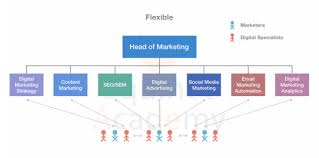Designing a unique startup marketing team structure for startups involves a delicate balance between specialization and collaboration. By focusing on versatility, agility, and fostering cross-functional partnerships, startups can create a marketing powerhouse that propels them towards success.
As the business landscape continues to evolve, an adaptable and innovative team structure will remain a driving force behind startup growth.
The Core Pillars of Startup Marketing Team Structure
The foundation of a successful marketing team structure lies in its core pillars:
Versatility: Startup teams need members who can wear multiple hats. A compact team with diverse skills can pivot quickly and address various challenges.
Collaboration: Open communication and cross-functional collaboration between team members foster innovation and drive comprehensive strategies.
Agility: The ability to adapt to rapidly changing market trends is crucial for startups. A lean and agile team structure enables quick decision-making and implementation.
Defining Roles and Responsibilities
Marketing Leadership
Chief Marketing Officer (CMO): Responsible for the overall marketing strategy, goal setting, and alignment with the company’s vision.
Marketing Manager: Oversees day-to-day operations, manages campaigns, and ensures team efficiency.
Creative Team
Content Creators: Writers, designers, and videographers responsible for crafting compelling content across various channels.
Create visually engaging assets for digital and print media.
Digital Marketing
Digital Strategist: Develops and implements online marketing campaigns, including SEO, social media, email, and paid advertising.
Social Media Manager: Manages the company’s social media presence, engages with the audience, and monitors trends.
Data Analytics
Analytics Specialist: Tracks and analyzes marketing data to measure campaign performance, assess ROI, and make data-driven decisions.
Market Researcher: Gathers insights into consumer behavior, market trends, and competitive analysis.
Partnerships and Outreach
Partnership Manager: Establishes and nurtures partnerships with other brands, influencers, and industry players.
PR Specialist: Manages public relations efforts, handles media relations, and builds the startup’s public image.
Flexibility and Cross-Functional Collaboration
In a startup environment, rigid silos can hinder creativity and innovation. Encourage collaboration across roles and departments:
Regular Meetings: Hold cross-functional meetings to share insights, ideas, and progress updates.
Rotating Roles: Allow team members to step into different roles periodically to gain new perspectives and broaden their skill set.
Technology and Tools
Leverage technology to enhance efficiency and streamline processes
Project Management Tools: Platforms like Asana, Trello, or Monday.com help manage tasks, timelines, and project assignments.
Analytics Platforms: Utilize tools like Google Analytics, HubSpot, or Mixpanel to track and analyze marketing efforts.
Social Media Management Tools: Buffer, Hootsuite, or Sprout Social can streamline social media scheduling and monitoring.
In today’s dynamic business landscape, startups must navigate a sea of challenges to stand out and succeed. A well-structured marketing team is a critical component of a startup’s growth strategy. The right team structure can drive efficient execution, enhance creativity, and maximize the impact of limited resources.
Read Also: How to Start a Business with No Money or Experience
Leading Successful Marketing Teams

In the world of marketing, leadership is the compass that guides teams towards success. Effective marketing team leadership involves a delicate balance of vision, empowerment, communication, and adaptability.
A leader who cultivates creativity, leads by example, and fosters a sense of unity creates an environment where team members thrive and produce remarkable results. As the marketing landscape continues to evolve, these leadership principles will remain the cornerstone of achieving enduring success.
Vision and Strategy: A proficient marketing team leader sets the course by establishing a clear vision and strategic direction. This involves aligning marketing efforts with the overall business goals, ensuring that each campaign and initiative contributes to the larger picture.
By having a well-defined roadmap, the team can work harmoniously towards a common purpose, minimizing confusion and maximizing productivity.
Empowering Team Members: Effective leadership is about nurturing the potential of each team member. Empowerment involves delegating responsibilities and giving team members the autonomy to make decisions within their domain. When team members feel trusted and valued, they’re more likely to take ownership of their tasks and deliver exceptional results.
Cultivating a Creative Environment: Innovation and creativity thrive in an environment that encourages diverse perspectives and open communication.
A skilled marketing team leader fosters creativity by promoting brainstorming sessions, welcoming new ideas, and acknowledging the importance of experimentation. This not only leads to fresh marketing strategies but also boosts team morale.
Effective Communication: Clear and transparent communication is the bedrock of any successful team. A competent leader ensures that objectives, expectations, and feedback are conveyed effectively. Regular check-ins, team meetings, and one-on-one conversations facilitate a collaborative atmosphere where concerns are addressed and progress is tracked.
Adaptability and Flexibility: The marketing landscape is ever-evolving, with new technologies and trends emerging rapidly. A resilient leader is adaptable and open to change, ready to pivot strategies when needed. This flexibility trickles down to the team, encouraging them to embrace change and view challenges as opportunities for growth.
Leading by Example: Actions speak louder than words. A strong marketing team leader exhibits the behaviors and qualities they expect from their team. Whether it’s a strong work ethic, a commitment to excellence, or a positive attitude, leading by example sets the tone for the team’s work culture.
Recognizing and Rewarding Success: Acknowledging achievements and celebrating milestones fosters a sense of accomplishment and motivates the team. A proficient leader recognizes the hard work of team members and provides constructive feedback to aid in continuous improvement. Rewards, whether tangible or verbal, demonstrate appreciation and encourage consistent dedication.
Building a Cohesive Team: Harmony among team members enhances collaboration and efficiency. A skilled leader actively nurtures relationships within the team, encourages cross-functional collaboration, and addresses conflicts promptly. By creating a supportive atmosphere, a marketing team can work harmoniously towards shared goals.
In today’s dynamic business landscape, effective marketing team leadership is a crucial component of achieving organizational success. The role of a marketing leader goes beyond just overseeing campaigns and strategies; it involves inspiring and guiding a diverse team towards a common goal.
Startup Marketing Team Collaboration
The journey from an idea’s inception to its successful execution is paved with collaborative efforts, where each team member contributes a unique brushstroke to the canvas.
By fostering effective communication, embracing cross-functional synergy, and leveraging technology, startup marketing teams can rise above challenges and create impactful campaigns that leave a lasting impression on the market.
The Power of Cross-Functional Synergy: Startup marketing transcends mere promotion; it’s about crafting narratives that resonate with the target audience. This complex task demands a blend of diverse skills: from creative writers and designers to analytical strategists and tech-savvy SEO specialists.
The magic happens when these individuals, each armed with their unique expertise, collaborate to transform ideas into compelling campaigns.
Effective Communication as the Cornerstone: At the heart of seamless collaboration lies effective communication.
A startup marketing team should cultivate an environment where every member feels comfortable expressing ideas, asking questions, and providing constructive feedback. Regular meetings, brainstorming sessions, and open channels of communication ensure that everyone is on the same page, fostering a sense of shared purpose.
Breaking Down Silos: In startups, roles and responsibilities can often blur, and this is especially true in marketing. Team members should not be confined to their specific domains; instead, they should be encouraged to explore beyond their comfort zones.
For instance, a content writer could contribute valuable insights to a social media campaign, infusing it with a unique perspective.
Embracing Agile Methodologies: Agile methodologies, borrowed from software development, have found a new home in marketing. The iterative approach allows marketing teams to adapt swiftly to changing market dynamics. Regular sprints, quick feedback loops, and a willingness to pivot based on real-time data can lead to more impactful campaigns.
Leveraging Technology for Collaboration: In the digital age, collaboration tools have become indispensable. Project management platforms, virtual whiteboards, and communication apps bridge geographical gaps and enable real-time collaboration. These tools not only streamline workflows but also foster a sense of unity among dispersed teams.
Encouraging Creativity and Experimentation: Collaboration thrives when creativity is encouraged. Startup marketing teams should feel empowered to think outside the box and experiment with innovative strategies. Embracing failure as a stepping stone to success can lead to breakthrough campaigns that resonate with audiences on a deeper level.
Measuring and Celebrating Success: Effective collaboration should be quantifiable. Key performance indicators (KPIs) such as conversion rates, engagement metrics, and customer feedback help measure the impact of collaborative efforts.
Celebrating these successes not only boosts team morale but also reinforces the idea that teamwork is the driving force behind achieving milestones.
In the dynamic realm of startups, marketing plays a pivotal role in defining success. However, success doesn’t hinge solely on innovative ideas or groundbreaking products. Rather, it’s the seamless collaboration within the startup marketing team that propels these ideas to the forefront of the market.
Read Also: How to Find Investors for Real Estate Flipping
Startup Marketing Team Roles

In the dynamic and competitive world of startups, crafting a robust marketing strategy is the bridge between obscurity and recognition. A well-coordinated marketing team is essential to propel a startup towards success, enabling it to carve a niche in the market.
Chief Marketing Officer (CMO): At the helm of the marketing team stands the CMO, the visionary who shapes the marketing strategy. This role involves a deep understanding of the startup’s goals, market trends, and customer behavior. The CMO guides the team’s direction, making crucial decisions that align marketing efforts with the company’s objectives.
Content Maestro: In the age of information, content reigns supreme. The Content Maestro is responsible for creating engaging and valuable content that educates, entertains, and resonates with the target audience. From blog posts to videos, podcasts to social media updates, this role requires creativity, adaptability, and a knack for storytelling.
Data Whisperer: Data-driven decisions are the bedrock of successful marketing campaigns. The Data Whisperer is the analyst who dives deep into metrics, tracking key performance indicators (KPIs) and transforming data into actionable insights.
They keep a pulse on campaign effectiveness, identifying areas for improvement and pivoting strategies when necessary.
Brand Enchantress/Enchanter: Building a brand isn’t just about a logo and color scheme. The Brand Enchantress/Enchanter is the guardian of the startup’s identity, ensuring consistency across all touchpoints. This role crafts a unique brand voice, narrative, and visual identity that sets the startup apart in a crowded market.
Social Media Sorcerer: Social media is the modern marketplace, and the Social Media Sorcerer is its gatekeeper. This role devises engaging social media strategies, manages platforms, and interacts with the audience. Their goal is to foster genuine connections, build a loyal following, and convert interactions into conversions.
SEO Alchemist: Visibility in the digital realm hinges on search engine optimization (SEO). The SEO Alchemist ensures the startup’s online presence is discoverable by optimizing content, keywords, and technical aspects of the website. They stay up-to-date with search engine algorithms to maintain a high ranking.
Campaign Conjurer: Specializing in campaign execution, the Campaign Conjurer brings ideas to life. They design, launch, and monitor marketing campaigns, collaborating with various team members to synchronize efforts. Attention to detail and project management skills are essential in this role.
Customer Advocate: At the heart of any successful marketing endeavor is the customer. The Customer Advocate listens, understands, and represents the customer’s voice within the team. They provide valuable insights that shape campaigns and foster customer-centric strategies.
Influencer Magician: Influencers hold the power to amplify a startup’s reach exponentially. The Influencer Magician identifies and collaborates with key influencers in the industry, leveraging their audience to create authentic connections and credibility for the startup.
In the symphony of startup marketing, each role plays a distinct note, contributing to the harmonious growth and recognition of the venture.
While these roles are unique, collaboration and communication among team members are essential to create a unified and effective marketing strategy. As startups continue to disrupt industries, their marketing teams will remain the catalysts for transforming innovation into impactful market presence.
Read Also: 7 Medicinal Health Benefits of Bitter melon (Momordica charantia)
